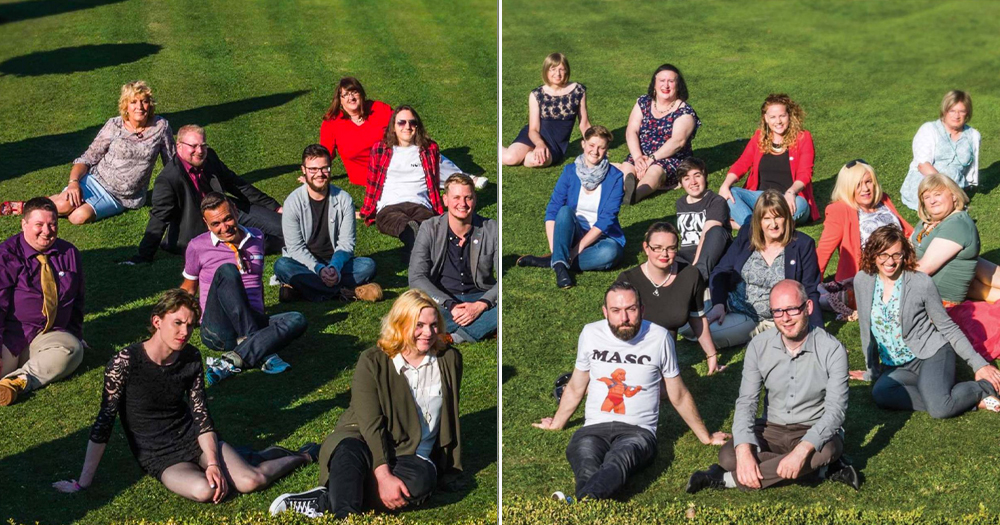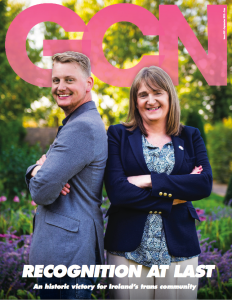To mark 10 years since the Gender Recognition Act was passed in Ireland, we have dug into the depths of the GCN Archive to uncover how the magazine covered the struggle that led to the passage of the law. This article, from GCN Issue 309, looks at the journey to legal gender recognition and how it impacted trans people in Ireland.
On July 15, members of the trans community and our supporters congregated outside Leinster House. We popped open a bottle of champagne ot celebrate the passage of the Gender Recognition Act, which had just moments before completed the final stages in the Seanad. We toasted to Dr Lydia Foy’s courageous journey and celebrated how far we have come as a movement.
We were all grins at this incredible victory for the trans community in Ireland. For the first time, the State has truly acknowledged our existence. This means that we will now be able to live our lives as who we are, not who we were. The Gender Recognition Act provides a process that enables trans people to achieve full legal recognition of our preferred gender and allows us to get a new birth certificate that reflects this change.
Birth certificates are a foundational identity document and are often requested for official purposes (like when we go to social welfare, obtain a PPS number and get married). Having proper identification is incredibly important because it means we can live our daily lives as who we are. Without appropriate documentation, we are at constant risk of being ‘outed’ when we apply for a job, a new passport, entry to education or even when we go to a club. Forced outing can, and often does, result in harassment, discrimination and sometimes violence.
But the passage of the Gender Recognition Act is not just important on a practical level; it is symbolically and politically important as well. With the passage of this law, Ireland has emerged as a global leader in trans rights by becoming the fourth country in the world ot specifically introduce legislation based on self-determination. We join Argentina, Denmark, Malta and most recently Colombia, in removing all medical criteria from the legal recognition process. This means there is no requirement for medical interventions or diagnosis of a mental disorder.
This allows trans people over the age of 18 to self-declare our gender identity without the interference of medical practitioners. What is so important about this legislation
is that we trans people are acknowledged as experts of our own identity. There is a clear distinction between the legal process and medical interventions. For many trans people,
a physical transition (hormones and/or surgery) is both medically necessary and critical to our mental health and wellbeing. However, the choices that we make to change our bodies (or not) should be a private matter between ourselves and our doctors. Now, in the eyes of the law, I am a man because I say so, not because a psychiatrist signs a letter or because an endocrinologist agrees. Self-determination is at the core of our human rights.
The journey to legal recognition has been a long one. In 1993, Dr Lydia Foy first asked for her birth certificate to be changed to reflect her true identity. Twenty-two years later, her journey has finally come to an end. Dr Foy’s persistence and her perseverance in the face of adversity, should be honoured. Dr Foy was on the front lines long before there was any semblance of a trans community. She was struggling for trans rights when most did not even know what the word ‘trans’ meant. Her case took a great toll on her personal and private life, and for this we owe her a great debt. We are also grateful to Michael Farrell and the team at FLAC (Free Legal Advice Centres) who has legally represented Dr Foy since 1997.
This victory for trans rights was also the result of so many activists, advocates, families and allies who worked hard to ensure that the legislation passed and that it was the best it could be. Members of TENI and activists across the country met with countless politicians and shared their stories and experiences. Through this process we changed hearts and minds one person at a time.
TENI was also assisted by many phenomenal LGBT and human rights organisations that actively supported our quest for trans rights. There is not enough space to list everyone who worked so tirelessly and passionately, but on behalf of TENI we would like ot thank each and every one of you for your efforts and contributions. Special thanks must go to Tánaiste Joan Burton and Minister Kevin Humphreys who showed great leadership in this area. We must also express our sincere gratitude to all the TDs and Senators that we worked closely with across political parties who listened, supported and progressed hte legislation. Without this help, we would not be where we are today.
Increasingly, trans people are stepping out of the shadows. We are sharing our stories and becoming visible in Irish society. There is no one way to be trans and there is no single narrative that encapsulates a trans experience. We are a diverse, multi-faceted community and it is important that our identities are acknowledged and celebrated.
Despite the incredible strides we have taken in 2015 for LGBT equality, there is still more work to be done. The Gender Recognition Act is far from perfect. The law does not meaningfully include young trans or intersex people. We know these young people face challenges in school and the lack of legal recognition fails to acknowledge a core element of these young people’s identities.
This exacerbates feelings of stigmatisation, isolation and exclusion. Legal recognition is critical to these young people’s daily lives. The current legislation also excludes individuals with a non-binary identity, those who do not want to have either ‘M’ or ‘F’ on their birth certificate. There are a growing number of trans people who identify outside the binary and their experiences have been invisible thus far. This needs to change.
In the coming months and years we will be campaigning for those who were not included and we will be working to improve this legislation, and other legislation, to ensure that all trans and intersex people are recognised and protected. This is one incredible step forward but it is not the end. It is only the beginning.
Stay tuned for more articles from 2015 as part of the #GenderRec10 campaign. To look through the GCN Archive for yourself, see the issues from 1988 to 1998 here, and more recent issues here.
© 2025 GCN (Gay Community News). All rights reserved.
This article was published in the print edition Issue No. 309 (September 1, 2015). Click here to read it now.
Support GCN
GCN is a free, vital resource for Ireland’s LGBTQ+ community since 1988.
GCN is a trading name of National LGBT Federation CLG, a registered charity - Charity Number: 20034580.
GCN relies on the generous support of the community and allies to sustain the crucial work that we do. Producing GCN is costly, and, in an industry which has been hugely impacted by rising costs, we need your support to help sustain and grow this vital resource.
Supporting GCN for as little as €1.99 per month will help us continue our work as Ireland’s free, independent LGBTQ+ media.

